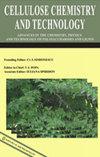SILYLATION OF PHOSPHORYLATED CELLULOSE
IF 1.1
4区 农林科学
Q2 MATERIALS SCIENCE, PAPER & WOOD
Cellulose Chemistry and Technology
Pub Date : 2023-07-20
DOI:10.35812/cellulosechemtechnol.2023.57.45
引用次数: 0
Abstract
In our work, using correlation analysis, we attempted to determine the effect of prior phosphorylation of the substrate with various organophosphorus compounds (OPC) of different nature on the degree of modification of the substrate with organosilicon compounds (OSC). We also tried to determine the dependence of silicon content in % by mass on the temperature and time of modification using the single-factor analysis of variance. It has been established that the pre-phosphorylation of the substrate increases the degree of its modification by the studied OSC. It is most likely due to the fact that polar OPC molecules, which have better penetrating and fixing abilities in the substrate, act as “conductors” of OSC into the substrate structure. The most effective “conductor” of OSC into the substrate, depending on modification time, can be considered tricresylphosphate (TCP) at a modification temperature of 20 degrees, because under these conditions, the correlation coefficients of OSC are higher than for other conditions of OPC processing. Dimethylphosphite (DMP) can be considered the most effective “conductor” of OSC into the substrate depending on the modification temperature because the correlation coefficients for all OSC are higher under these conditions than under other OPC processing conditions. It was found that there was a strong, direct correlation between the time of modification and the percentage of silicon content in the cellulose. The variation in the values of the calculated correlation coefficients ranged from 0.8927 to 0.9827. However, the direct correlation between the modification temperature and silicon content in cellulose in % was stronger and the scatter of correlation coefficients ranged from 0.9719 to 1.磷酸化纤维素的硅基化
在我们的工作中,使用相关性分析,我们试图确定不同性质的各种有机磷化合物(OPC)对底物的预先磷酸化对有机硅化合物(OSC)对底物修饰程度的影响。我们还试图使用单因素方差分析来确定硅含量(质量%)对改性温度和时间的依赖性。已经证实,底物的预磷酸化增加了所研究的OSC对其修饰的程度。这很可能是由于极性OPC分子在衬底中具有更好的穿透和固定能力,充当OSC进入衬底结构的“导体”。根据改性时间的不同,OSC进入基板的最有效“导体”可以被认为是在20度的改性温度下的磷酸三甲苯酯(TCP),因为在这些条件下,OSC的相关系数高于OPC处理的其他条件。亚磷酸二甲酯(DMP)可以被认为是OSC进入基板的最有效的“导体”,这取决于改性温度,因为在这些条件下,所有OSC的相关系数都高于在其他OPC处理条件下。研究发现,改性时间与纤维素中硅含量的百分比之间存在强烈的直接相关性。计算出的相关系数值的变化范围为0.8927至0.9827。然而,改性温度与纤维素中硅含量(%)之间的直接相关性更强,相关系数的分散范围为0.9719-1。
本文章由计算机程序翻译,如有差异,请以英文原文为准。
求助全文
约1分钟内获得全文
求助全文
来源期刊

Cellulose Chemistry and Technology
工程技术-材料科学:纸与木材
CiteScore
2.30
自引率
23.10%
发文量
81
审稿时长
7.3 months
期刊介绍:
Cellulose Chemistry and Technology covers the study and exploitation of the industrial applications of carbohydrate polymers in areas such as food, textiles, paper, wood, adhesives, pharmaceuticals, oil field applications and industrial chemistry.
Topics include:
• studies of structure and properties
• biological and industrial development
• analytical methods
• chemical and microbiological modifications
• interactions with other materials
 求助内容:
求助内容: 应助结果提醒方式:
应助结果提醒方式:


